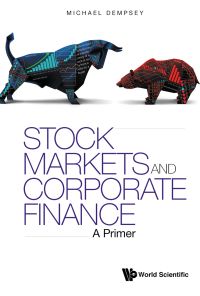Question
Note: Please make sure to review the accompanying video for this assignment, to ensure that you are getting the data from the correct sources. In
Note: Please make sure to review the accompanying video for this assignment, to ensure that you are getting the data from the correct sources. In Chapter 14, we described how to estimate a companys WACC, which is the weighted average of its costs of debt, preferred stock, and common equity. = ( ) + + Most of the data we need to do this can be found from various data sources on the Internet. I want you to get an estimate of the WACC of Target Corporation. (Ticker: TGT.) As a first step, you need to estimate what percentage of Targets capital comes from debt, preferred stock, and common equity. This information can be found on the firms latest annual balance sheet. You can access the historical balance sheets of Target on Yahoo!Finance.1 Go to Yahoo!Finance and search for TGT and then click on Financials. Note as of 01/31/2022, Target had no preferred stock. Total debt includes all interest-bearing long-term debt.
I. Recall that the weights used in the WACC are based on the companys target capital structure. If you assume that the company wants to maintain the same mix of capital that it currently has on its balance sheet, what weights should you use to estimate the WACC for Target?
II. Find Targets market capitalization, which is the market value of its common equity. This can be found by multiplying the current share price of Target with its outstanding number of shares (see under Statistics on Yahoo!Finance.) Assume that the market value of its debt equals its book value. Now using the market values, recalculate the weights to be used in the WACC equation. Note: make sure that the value of equity and debt are measured in the same scale.
You can use CAPM to estimate Targets cost of equity. = + (() ) Go to the U.S. Department of the Treasury website2 and obtain their estimates for the Daily Treasury Yield Curve Rates (HomepageDataInterest RateDaily Treasury Yield Curve Rates). You can use the 10-year Treasury yield as your estimate of the risk-free rate ( ). Go to Yahoo!Finance (see under Statistics) and use their estimate of beta ( ) for Target. You can estimate the market risk premium in several ways. Aswath Damodaran, a professor at NYU provides estimates of the market risk premium. According to his data the average implied market risk premium over the period of 2010-2020 was 5.61%.3 Lets use that as our estimate of the market risk premium. a) How would you interpret the Beta reported by Yahoo!Finance for Target? (i.e., comment of how risky/volatile the stock is.) b) What is your estimate for Targets cost of equity?
IV. Next, you need to calculate Targets cost of debt. Go to FINRAs Bond Center4 and do a quick search for Targets bond issues (SearchSymbol/CUSIP = TGT). A longer-term issues YTM (Yield) could provide an estimate of the firms current cost of debt to be used in the WACC calculation. Since you used the 10-year Treasury yield as your risk-free estimate, use the yield on any Target bond that is going to mature in 10 years (i.e., mature in 2032). If there is no bond maturing in 2032, then use the yield on a bond that will mature in 2031. Remember that you need the after-tax cost of debt to calculate a firms WACC; use 31% as the tax rate for Target. What is your estimate of Targets after-tax cost of debt?
V. Now you have all the elements to calculate the WACC for Target. a) What is your estimate of Targets WACC using the book-value weights calculated in part (I) above? b) What is your estimate of Targets WACC using the market-value weights calculated in part (II) above?
Step by Step Solution
There are 3 Steps involved in it
Step: 1

Get Instant Access to Expert-Tailored Solutions
See step-by-step solutions with expert insights and AI powered tools for academic success
Step: 2

Step: 3

Ace Your Homework with AI
Get the answers you need in no time with our AI-driven, step-by-step assistance
Get Started


